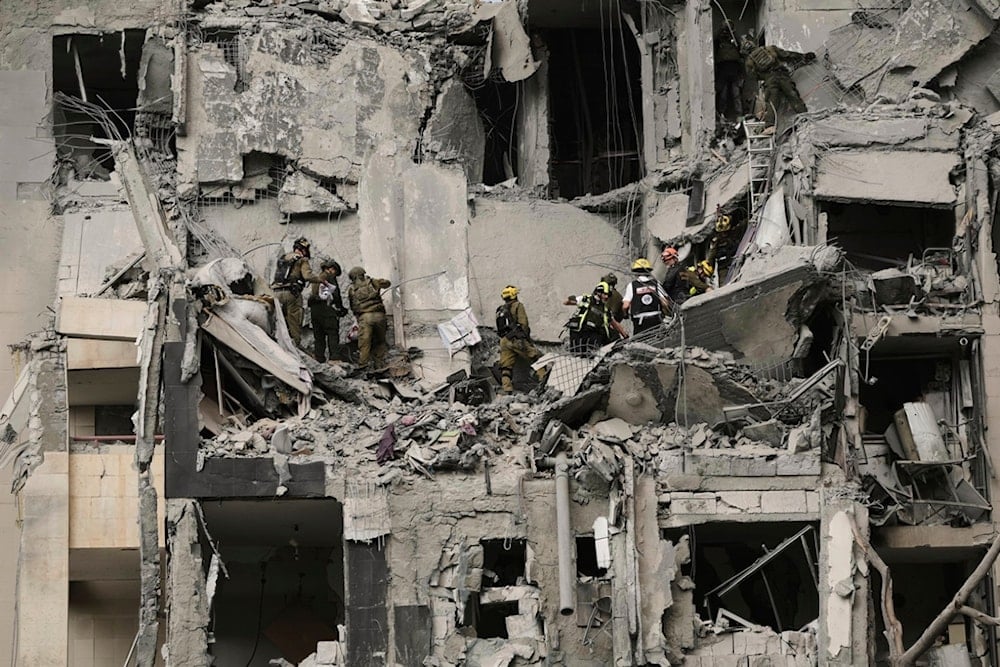Only a fraction of Iranian missiles impact revealed: Israeli media
Now that the dust has settled, the damage caused to strategic and sensitive Israeli bases and facilities is surfacing.
-

Israeli soldiers and rescue teams search for survivors amid the rubble of residential buildings destroyed by an Iranian missile strike, in occupied Bir al-Sabe', on Tuesday, June 24, 2025 (AP)
Iranian missiles accurately hit strategic bases and facilities, including the Weizmann Institute, causing significant damage that has not yet been disclosed, “Israel’s” Channel 13 revealed on Sunday..
Israeli media acknowledges accuracy of Iranian strikes
The outlet revealed that the Iranian missile strikes made direct impacts on many army bases and strategic facilities, but relevant information has not yet been disclosed.
The channel described the difficulty of grasping how precise the Iranians were and the extent of damage the Iranian missiles caused in many places.
Weizmann is just one example
Channel 13 indicated that while the damage caused to the Weizmann Institute was known to all, as much footage of the strike on the facility was circulated, there are still many sites that came under direct Iranian missile fire, yet information on the extent of damage caused is kept in the dark.
Meanwhile, the Israeli Army Radio acknowledged that "the Israeli military operation against Iran is the most complex in the history of the Israeli military.” In what it described as a "summary of the Israeli military operation against Iran," it said, "The Iranian threat will continue to haunt us, and Iran is not going anywhere."
Israeli censorship hindering assessment of damage from Iranian strikes
"Israel" has admitted to being struck by more than 50 missiles during its 12-day war on Iran, but the full scope of the damage may never be revealed due to strict press censorship.
Such media restrictions are long-standing in "Israel", where any content, written or visual, considered potentially harmful to the vaguely defined notion of “national security” can be legally suppressed.
Recently, the Israeli regime has further tightened its grip on wartime reporting.
Last week, Israeli police cut off broadcasts by multiple foreign news agencies reporting from locations hit by Iranian missiles, while footage published by The Times of Israel showed an Israeli police officer demanding that a cameraman surrender his recording equipment.
Israeli police stormed the offices of foreign TV news teams following their coverage of missile strikes in the Haifa region, which reportedly hit sensitive military sites.
Censorship intensifies amid military setbacks
Under current regulations, any footage or reporting from a “combat zone or missile impact site” must receive prior written approval from the military censor, according to the Israeli Government Press Office, which also oversees journalist accreditation.
The rules are especially strict when missile strikes hit near sensitive sites such as military installations, oil refineries, or other strategic infrastructure.
Jerome Bourdon, a professor of media sociology at Tel Aviv University, stated, "We probably will never know the full extent of the damage."
According to Bourdon, the increasingly restricted media environment is "a very clear desire to reverse the narrative," noting that the war on Iran comes as "Israel" faces growing global condemnation for its ongoing aggression on Gaza, which has killed tens of thousands and sparked a severe humanitarian crisis.

 3 Min Read
3 Min Read










